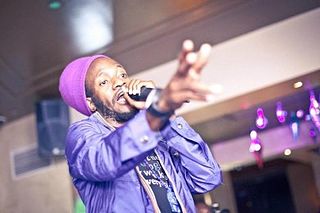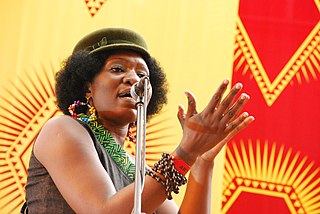
Harare, formerly Salisbury, is the capital and largest city of Zimbabwe. The city proper has an area of 982.3 km2 (379.3 sq mi), a population of 1,849,600 as of the 2022 census and an estimated 2,487,209 people in its metropolitan province. The city is situated in north-eastern Zimbabwe in the country's Mashonaland region. Harare is a metropolitan province which also incorporates the municipalities of Chitungwiza and Epworth. The city sits on a plateau at an elevation of 1,483 metres above sea level, and its climate falls into the subtropical highland category.

Mbira are a family of musical instruments, traditional to the Shona people of Zimbabwe. They consist of a wooden board with attached staggered metal tines, played by holding the instrument in the hands and plucking the tines with the thumbs, the right forefinger, and sometimes the left forefinger. Musicologists classify it as a lamellaphone, part of the plucked idiophone family of musical instruments. In Eastern and Southern Africa, there are many kinds of mbira, often accompanied by the hosho, a percussion instrument. It is often an important instrument played at religious ceremonies, weddings, and other social gatherings. The "Art of crafting and playing Mbira/Sansi, the finger-plucking traditional musical instrument in Malawi and Zimbabwe" was added to the UNESCO Representative List of the Intangible Cultural Heritage of Humanity in 2020.

Zimbabwean music is heavily reliant on the use of instruments such as the mbira, Ngoma drums and hosho. Their music symbolizes much more than a simple rhythm, as the folk and pop style styled music was used as a symbol of hope for Zimbabweans looking to gain independence from Rhodesia. Music has played a significant role in the history of Zimbabwe, from a vital role in the traditional Bira ceremony used to call on ancestral spirits, to protest songs during the struggle for independence. The community in Zimbabwe used music to voice their resistance to their oppression, as one of the only weapons they had available to fight back with. In the eighties, the Music of Zimbabwe was at the center of the African Music scene thanks to genres such as Sungura and Jit. However, several performers were banned by state TV and radio leading to the closing of several music venues.
Air Zimbabwe (Pvt) Ltd is the national carrier of Zimbabwe, headquartered on the property of Robert Gabriel Mugabe International Airport, in Harare. From its hub at Robert Gabriel Mugabe International Airport, the carrier used to operate a network within southern Africa that also included Asia and London-Gatwick. Following financial difficulties, Air Zimbabwe ceased operations in late February 2012. Serving a reduced domestic network, the carrier resumed operations for a short period between May and early July 2012, when flights were again discontinued. Some flights were restarted on a discontinuous basis in November that year. The airline resumed operating some domestic routes as well as the regional service to Johannesburg on a daily basis in April 2013.
Shona music is the music of the Shona people of Zimbabwe. There are several different types of traditional Shona music including mbira, singing, hosho and drumming. Very often, this music will be accompanied by dancing, and participation by the audience. In the Shona style of music, there is little distinction between the performer and the audience. Both are often actively involved in the music-making and both are important in the Shona religious ceremonies.
Zimbabwean hip hop is a variety of hip hop music that is popular in Zimbabwe. It emerged in the early 1990s. Prominent artists include Young Gemini,Noluntu J, Voltz JT ,Br3eze, Ti Gonzi, Junior Brown, Calvin, Saintfloew, Holy Ten, Mahcoy, Trey Heart, Asaph, Kriss Newtone, Suhn, Cyprian, Grade 1B Hichwii,Denim Woods, Hanna, Tanto Wavie, Tehn Diamond, Synik, Joie LeFeu, Hurrikane, Maskiri, T3rry Tempo, TreyXL, Munetsi, Bling4, Tha Bees, Bagga We Ragga and Raykaz.
Abraham Dumisani Maraire, known to friends as "Dumi", was a Zimbabwean musician. He was a master performer of the mbira, a traditional instrument of the Shona people of Zimbabwe. He specialized in the form of mbira called nyunga nyunga, as well as the Zimbabwean marimba. He introduced Zimbabwean music to North America, initiating a flourishing of Zimbabwean music in the Pacific Northwest that continues into the 21st century.
Chirikure Chirikure, is a Zimbabwean poet, songwriter, and writer. He is a graduate of the University of Zimbabwe and an Honorary Fellow of University of Iowa, US. He worked with one of Zimbabwe's leading publishing houses as an editor/publisher for 17 years, until 2002. He now runs a literary agency and also works as a performance poet, cultural consultant and translator.
Articles related to Zimbabwe include:

Chiwoniso Maraire was a Zimbabwean singer, songwriter, and exponent of Zimbabwean mbira music. She was the daughter of Zimbabwean mbira master and teacher Dumisani Maraire. Describing the mbira, an instrument traditionally used by male musicians, she said, "It is like a large xylophone. It is everywhere in Africa under different names: sanza, kalimba, etc. For us in Zimbabwe it is the name for many string instruments. There are many kinds of mbiras. The one that I play is called the nyunga nyunga, which means sparkle-sparkle."

Winky D is a Zimbabwean reggae-dancehall artist, popularly known as "The Big Man". His music provides social commentary about Zimbabwean society.
Mukudzeyi Mukombe, better known as Jah Prayzah, is a Zimbabwean contemporary musician and lead member of the band Third Generation. Regarded as the most prolific musician of his generation in the country, he was popularly referred to by fans and media as "Masoja", the Shona word for "soldier", a name he earned mostly because of his signature band uniform of military regalia. The name "Jah Prayzah" comes from his name, "Mukudzeyi", which means "Praise Him".

John Cole is a Zimbabwean choreographer and performing artist.

Monoswezi is a trans-national music collective composed of Hope Masike, Calu Tsemane, Hallvard Godal, Putte Johander (bass), and Erik Nylander. The band's name is a portmanteau from the first few letters of the members’ respective nationalities: Mozambique, Norway, Sweden and Zimbabwe. Monoswezi is also a combination of the Greek word “mono”, meaning “one”, and “swezi”, which means “world” in a native South African dialect. Their music has been classified as a fusion between Scandinavian and African music, under the expansive “jazz” umbrella.

Edith Katiji, known professionally as Edith WeUtonga, is a Zimbabwean Afro-jazz and traditional music artist, bass guitarist, songwriter, actress and music teacher. She was born in Kadoma, which lies approximately 166 kilometres (103 mi), by road, southwest of Harare. Being of Malawi origin and growing up in Bulawayo she sings in four different languages mainly Shona, Chichewa, Ndebele and English. Her band is called Utonga which means dawn. She is one of only a few bass guitarists in Zimbabwe who is also a lead vocalist for a band. She also plays the acoustic guitar, mbira and drums.
Selmor Mtukudzi is a Zimbabwean musician and actress. She is the daughter of the late Zimbabwean music icon and national hero, Oliver Mtukudzi.

Janet Manyowa is a Zimbabwean gospel musician.

Learnmore Mwanyenyeka formerly known as Long John the Comedian and now known professionally as Learnmore Jonasi, is a Zimbabwean stand-up comedian, actor and MC. He is also known as "The Village Boy" and has won the 2019 National Arts Merit Awards as the Outstanding Comedian of the Year and the 2019 Savanna Comic Choice Awards as the Pan African Comic of the Year. He was people's choice award winner in Steve Harvey's Stand Up Spotlight competition in 2019. In 2020 he won the National Arts Merit Awards as the Outstanding Comedian of the Year.
Thamsanqa 'Tamy' Moyo is a Zimbabwean musical artist and actress. She rose to fame after releasing her 2016 song “Ndibereke" she is also known for her role in the 2020 film “Gonarezhou".
Mudiwa Hood is a Zimbabwean rapper, singer, and actor.










